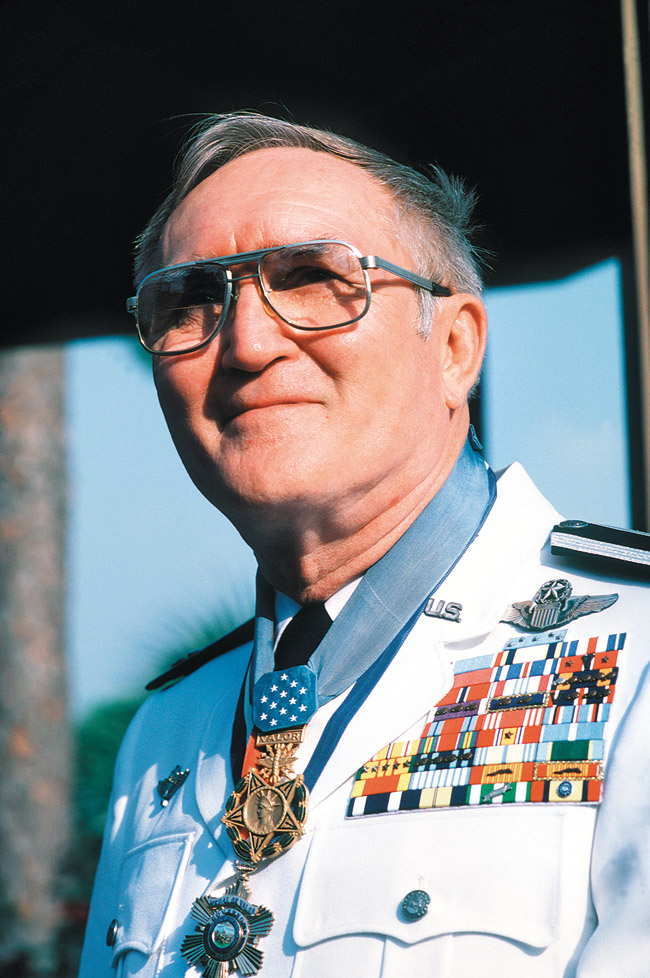A True American Patriot, Hero

Col. Bud Day with a few of his medals, including the Congressional Medal of Honor | Photo from Jerry Coffee
As a kid I saw Gary Cooper in the movie Sergeant York, about the Tennessee sharpshooter of WWI fame. A Pacifist by nature, he became an unlikely hero when, nearly single-handedly, he took out several German machine gun nests and captured 132 German soldiers. According to the film, he picked off 17 of the gunners with his “Turkey Shoot” marksmanship. Harkening back to the tactics of his youth, he made turkey sounds (“gobble gobble gobble”). When the curious German gunners raised their heads to check out the gobbling, he picked them off one by one.
Ultimately, Sgt. York became one of the most decorated soldiers of WWI, with the Congressional Medal of Honor, the Distinguished Service Cross (the Army’s highest) and the French Croix de Guerre.
He used the money he made on the movie to start a Bible college.
WWII’s Audie Murphie, product of a poor, Texas share croppin’ family, conned his way into the Army at age 16. From the liberation of Rome in 1944 to the invasion of France on “D-Day,” he was seriously wounded several times, and according to Wikipedia, was “awarded every U.S. Military award for valor available from the U.S. Army.” For his unprecedented heroism in battle – he stood unprotected atop a burning tank destroyer and single-handedly killed 50 enemy soldiers from an advancing German unit – he was awarded his Congressional Medal of Honor.
Perhaps even more significantly, his own post-war “battle fatigue” or “shell shock” – what we now know as post-traumatic stress disorder – actually drew the first attention to that syndrome for Korea and Vietnam vets, and now is a well-known reality of modern warfare.
I am drawn to the stories of York and Murphy because we have just lost another hero, actually a hero’s hero, U.S. Air Force Col. George “Bud” Day, with whom I spent some intense times in North Vietnam. During a part of our overlapping time in the Hanoi Hilton, I had the privilege and honor to serve under his command in a cell bay of 30 or so men. He was the toughest man I’ll ever know, and because of that, our enemy went to extraordinary lengths to break him.
Before Vietnam, Bud served in WWII as a marine in the Pacific theatre, and as an Air Force bomber pilot for two tours in Korea. By the time he retired from active duty, his dedication and bravery – especially in Vietnam – had garnered more than 70 medals and decorations. Second only to Gen. Douglas McArthur (another three-war warrior), Bud Day was the most highly decorated American military officer in modern history.
His capture and escape story is legendary. Shot down in an Air Force F-100 Super Sabre over North Vietnam, an arm and a knee were broken, and one eye damaged. Thinking he was hurt too badly to escape, his young guard’s inattention allowed him to escape into the countryside. He roamed and evaded recapture near the DMZ for several days, was incapacitated by an exploding bomb or artillery shell, subsisted on berries and frogs, eventually swam across the Ben Hai river (the DMZ) into South Vietnam, and then, within sight of a U.S. Army outpost, was shot in the hand and leg by Viet Cong guerrillas, recaptured, and returned to North Vietnam.
For this heroic escape attempt and for his subsequent five and a half years of unyielding resistance to communist torture and isolation, and for his enduring inspirational leadership, he was awarded the Congressional Medal of Honor.
Not content to rest on his laurels, and using his law degree earned between WWII and Korea, Bud spent his “retirement” years crusading for veteran’s benefits, winning expanded health coverage for vets over age 65.
Last week in his Senate floor eulogy, John McCain said of our mutual friend: “He was the bravest man I’ve ever known, and his fierce resistance and resolute leadership set an example for all of us how to return home with honor.”
I last saw Bud a year ago here at Punchbowl, where the Congressional Medal of Honor Society was dedicating a plaque as a part of its annual meeting. During our reunion, it was apparent, at age 87, he still intended to “burn out” going up.
Col. Bud Day … still an inspirational leader worth following.





